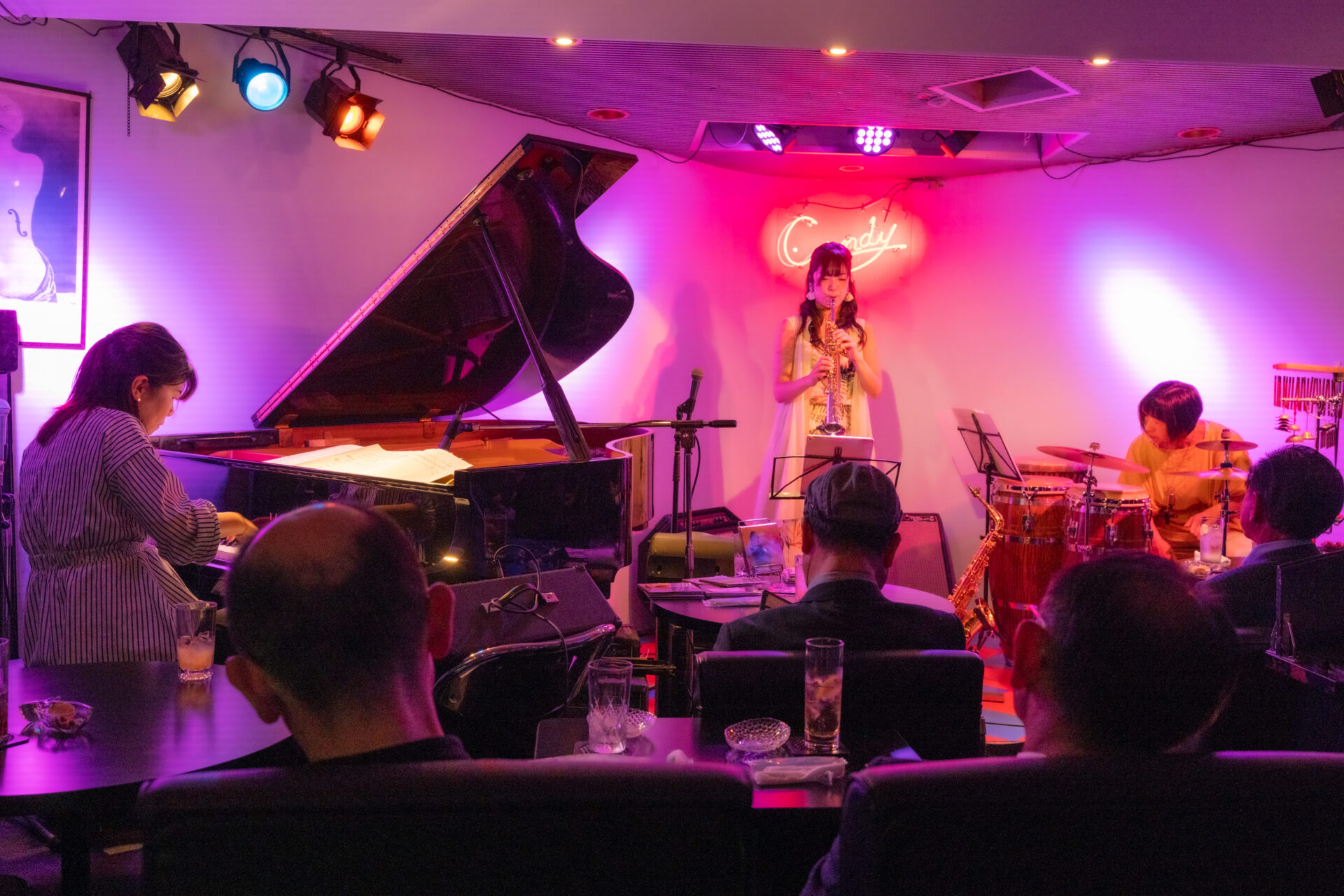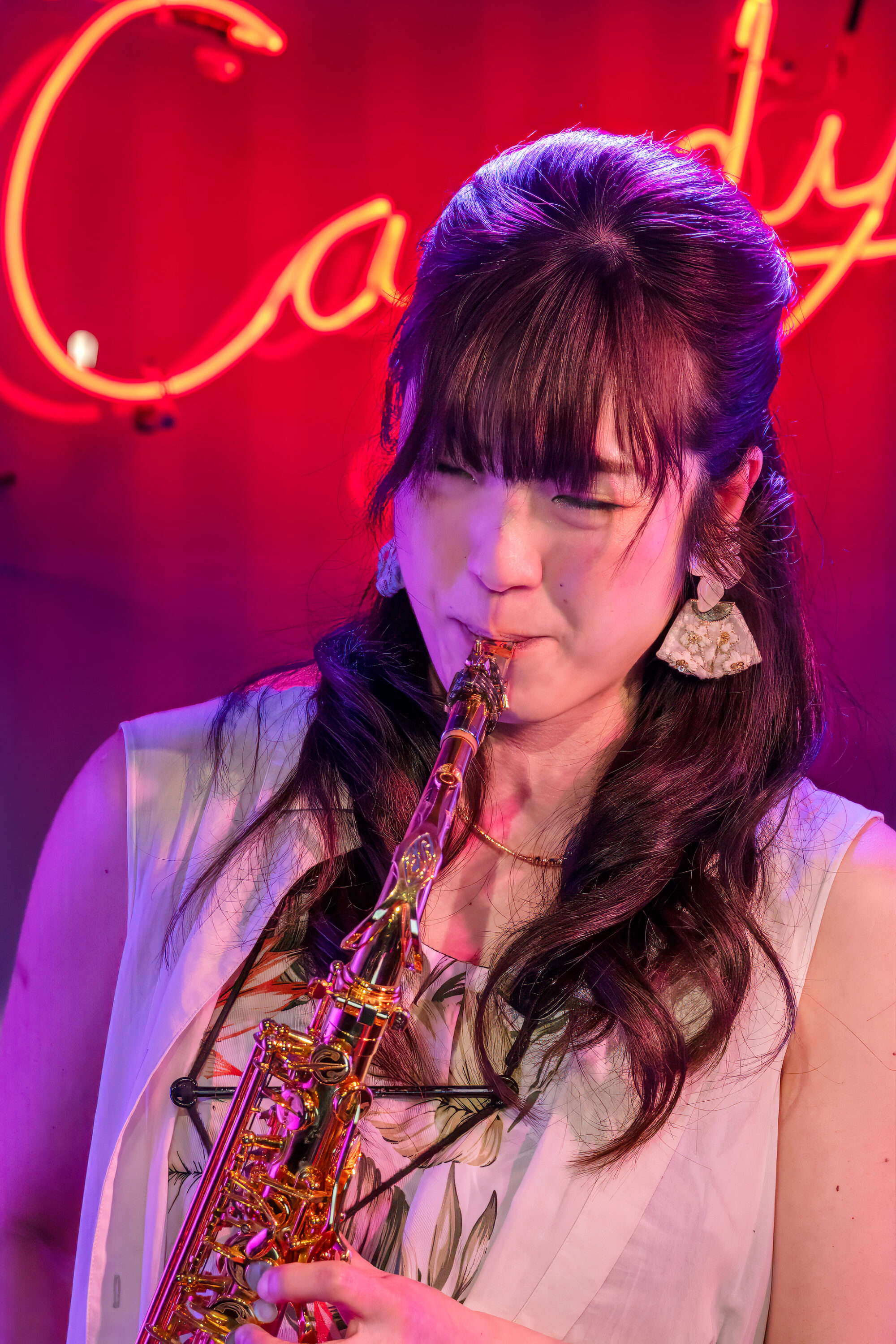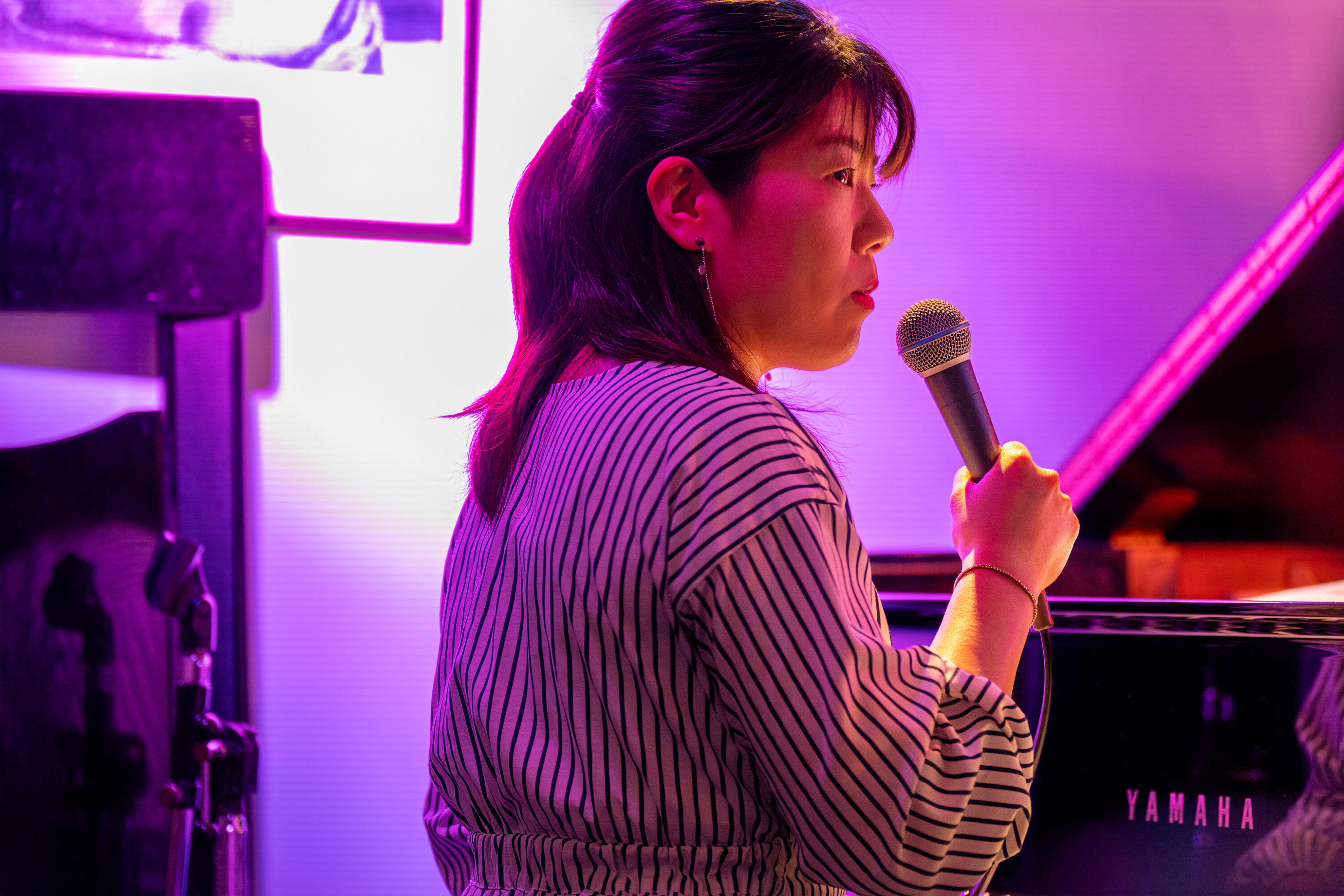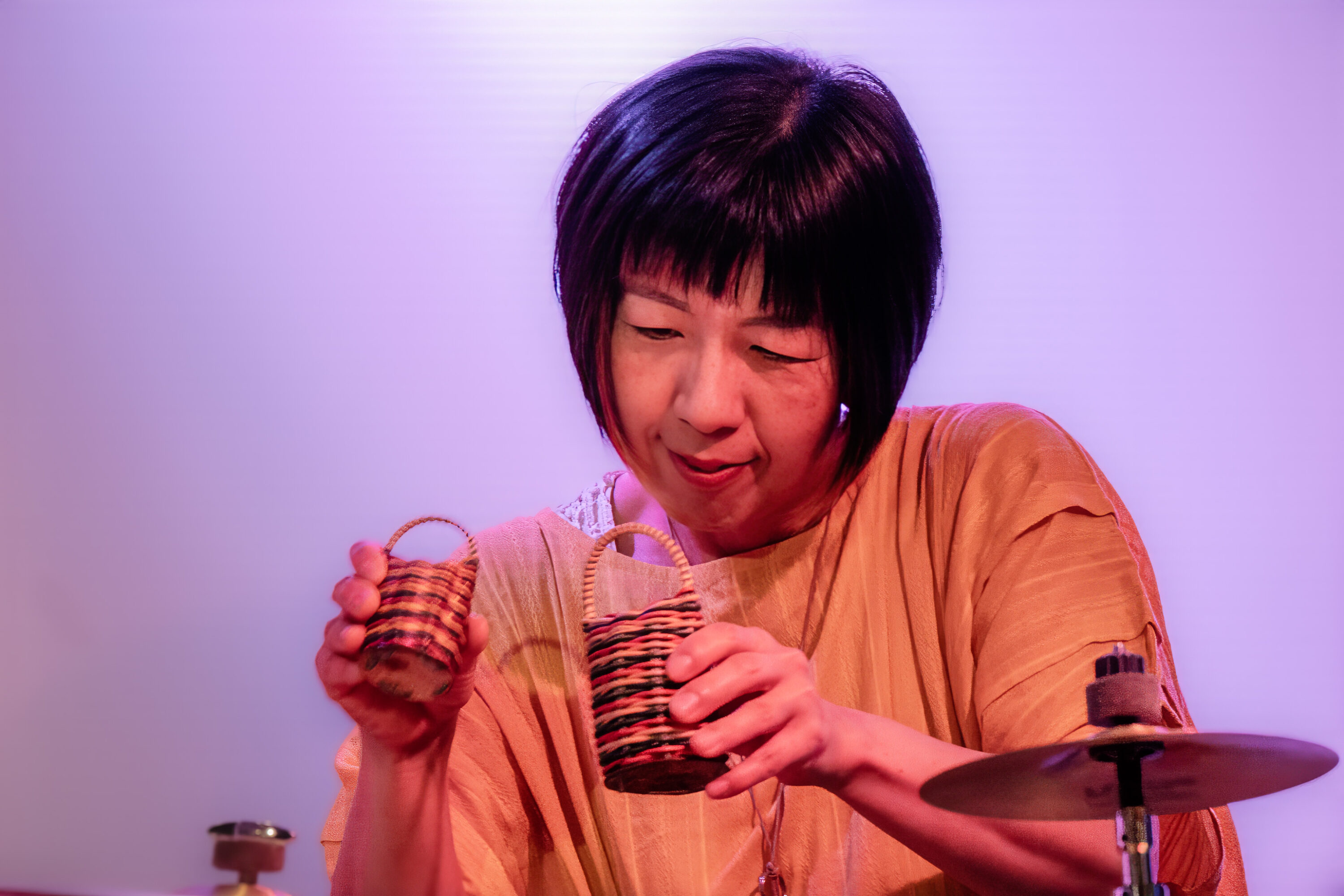This post is also available in:
日本語 (Japanese)
Back to the Garden at Candy Live Jazz in Kyoto (April 17, 2024)
 Photo © by Christopher Pelham
Photo © by Christopher PelhamOn my second night in Kyoto, I went to Candy Live Jazz in Gion to see the trio of Kotono Nishimura 西村琴乃 (alto and soprano sax), Yuka Yanagihara 柳原由佳 (piano), and Ayuko Ikeda 池田安友子(percussion). I was not familiar with any of them, but from the start, I found their music infectious, rhythmically adventurous, and uplifting.
Candy Live Jazz is an intimate yet comfortable and classy-looking club with a reputation for booking quality musicians. Like many jazz clubs in Japan, it offers a variety of alcoholic beverages and a selection of snacks. Admission was ¥2300 with the purchase of a small appetizer (¥500 minimum) + drink (¥600 minimum). Even without the favorable exchange rate, the fee is extremely reasonable for such a nice club in a major city. I arrived early and had my choice of seats. Later, it filled up, a good sign.
Kotono did most of the speaking between songs, most of which were written by her or Yuka, and was evidently the trio’s leader. They exhibited a relaxed camaraderie, and I could tell they were quite familiar and comfortable with one another and delighted in playing together. If forced to classify their style, I would call it smooth jazz, enlivened by the creative choices each brings to it.
At times, most notably during Kotono’s number “Milky Way” from her album “Favorable Move,” I felt as if I’d been transported to a landscape untarnished by humans, where dawn is breaking over mountains in a river-fed valley of verdant splendor where you can hear birds singing and take a breath, like in a Thomas Cole painting, a place where you can look up on a clear, moonless night and be awestruck by the majesty of the Milky Way, so far away and yet seemingly so close. Yuka’s piano confidently paints the terrain, Kotono’s bright tone invokes the energizing sun, and Yuka’s wide-ranging pallet of organic sounds steep us in birdsong and fragrant earth. I think of Joni Mitchell’s refrain from “Woodstock,” where another new/old world was invoked, “We are stardust. We are golden. And we’ve got to get ourselves / Back to the Garden.”
From song to song, their compositions feature a wide range of melodies and adventurous rhythms. Some are more spare and introspective, others fast and funky. Many of them, such as “Sunny Rain,” “Vinca (Periwinkle),” “Sakura,” “March 2018,” and “Milky Way,” take inspiration from nature, as does their choice of cover song, “Haru Yo, Koi (Come Spring),” a children’s song composed in 1923 with lyrics by Gyofuu Souma and music by Ryuutarou Hirota. While the song is familiar to almost everyone inside Japan and has enjoyed surprising longevity, especially for a children’s song — a 1994 pop cover by Yumi Matsutoya has been played nearly 37 million times on YouTube — Kotono said that it would be a little uninteresting to play straight so she gave a contemporary twist to this arrangement.
Although they performed it as an instrumental, I believe every Japanese in the audience was recalling the song’s lyrics, which vividly describe a young girl, little Mii-chan, taking her first steps in straw sandals with red thongs, longing for spring to come quickly so she can explore this beckoning new world. In front of the house, a peach tree’s swollen buds echo her growth and eagerness to bid farewell to the snow-covered landscape.
Memories of our children when they were very young or of our own childhoods fill us with nostalgia. By introducing greater harmonic complexity to her arrangement, Kotono scraped some of the cuteness and sentimentality from the song to excavate the insistent energy of youth, the inevitability of the changing seasons, and the bittersweetness of the ephemerality of such moments. Kotono’s own daughter had just recently taken her first steps and must have shared Mii-chan’s eagerness to greet the new world outside. I wondered if she was thinking of her as well as the seasonal theme when she selected this song.
After the show, I asked them what was different about playing together as a female trio. They each said they’ve noticed no difference playing with male or female musicians; what matters is the feeling and musical groove, not the gender or sexuality of the person playing. Yet, these three do love playing together. They couldn’t remember precisely when they began, four to six years ago, but their busy schedules have only allowed them to get together one to three times a year.
Still, Kotono says this is her favorite ensemble. When she first heard Yuka’s compositions, Kotono knew she wanted to play with her. They both knew of Ayuko, who is famous as a percussionist, and thought she would be interesting to work with. When she agreed to join them, they realized that the sound as a trio was good and decided not to add a bass player. Now, even though they are all so busy and Kotono has the added demands of caring for her young daughter, they want to record another album together.
Kotono, a native of Kyoto, graduated from the Department of Instrumental Music, Faculty of Music, Osaka College of Music. She’s released two albums of original compositions, “First Note” in 2018 and “Favorable Move” in 2021. Both releases have been well-received. The first was recognized for its melodies and emotional depth and sold out within two years. The second, featuring all original compositions and the addition of percussion, garnered additional acclaim for her ingenuity in infusing smooth jazz with surprising rhythmic sophistication. She is also recognized for her playing, particularly her bright, attractive tone.
I brought home “Favorable Move,” which Yuka and Ayuko also play on, as it features several compositions they performed in this live set. I have enjoyed listening to it several times now. Kotono’s background in classical music and musical explorations during several trips to the United States have enriched her compositional imagination and helped her to develop accessible yet fresh and lively compositions that invite repeated listening. She won first place in the 17th Yangtze River Cup International Music Competition and placed fifth in the Japan Classical Music Competition’s national finals, further evidence of her compositional abilities.
 Photo © by Christopher Pelham
Photo © by Christopher Pelham
Kotono Nishimura 西村琴乃
 Photo © by Christopher Pelham
Photo © by Christopher Pelham
Yuka Yanagihara 柳原由佳
Yuka, from Osaka, plays about 300 shows a year, and not only jazz, in addition to composing and arranging. She’s also in demand for playing classical Japanese, Bossa Nova, and pop. Somehow, she’s found room over the last ten years to record and release ten albums — a mix of solo, duo, trio, and quartet recordings featuring originals and covers — under her name and play on quite a few more for other musicians. Her composition “Silence” from her second album, “Inner Views,” won the Jazz Audio Disc Award 2019 Melody Award from the magazine Jazz Critic.
Starting out on organ at age 4, Yuka began piano and drums at age 8. She wasn’t thinking of pursuing music as a career, but hearing Chick Corea’s fusion classic “Spain,” which her parents frequently played, excited something in her. She didn’t know who Corea was or anything about jazz, for that matter. She was planning to enroll in a vocational school to prepare to become an office worker, but when it became time to choose a high school, she instead chose the Koyo School of Music and Dance.
In 2006, she moved on to Berklee College of Music in Boston, which is affiliated with the Koyo School, on scholarship. She graduated in 2008 with a degree in Jazz Composition, establishing relationships with several musicians there, with whom she has continued to work, and performed extensively in the northeast United States before returning to Japan.
While she was in the States, she was able to attend workshops taught by Corea and see him perform live in NYC. She says that he continues to be her guiding inspiration, particularly his approach to finding one’s voice and trusting it confidently and his way of writing parts for multiple instruments and drawing on numerous musical traditions. Yuka has also been praised for her compositional ability to draw on disparate genres and create a rich interplay between instruments with compelling emotional textures.
Like Yuka, percussionist Ayuko Ikeda performs many genres of music, including classical, African, Latin, and jazz, as well as radio dramas and musicals. She also plays in ensembles featuring various Japanese and Chinese traditional instruments and styles, often using innovative combinations of percussion instruments from different cultures. Ayuko has toured abroad numerous times. In 1995, she performed with a percussion ensemble at Carnegie Hall. In 2004, she played in Sweden and Germany, and in 2005, in Australia. She’s also played on two albums recorded in Canada.
 Photo © by Christopher Pelham
Photo © by Christopher Pelham
Yasuko Ikeda 池田安友子
I’ll leave you with a video of Yuka playing and singing at UrBANGUILD with another uplifting all-female group, Colloid, which I had really wanted to see but could not on this trip. I did, however, see Colloid violinist/vocalist Akiko Agaki a week later at UrBANGUILD at a wild improv jam and will have more to say about them in a later article.

0 Comments